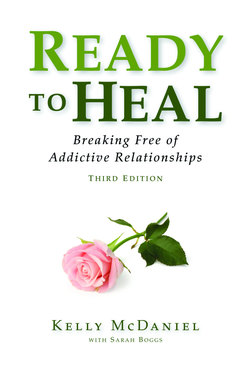Читать книгу Ready to Heal: Breaking Free of Addictive Relationships - Sarah Elisabeth Boggs - Страница 7
На сайте Литреса книга снята с продажи.
Giving the Problem a Name
ОглавлениеFor some of you, it may seem that there’s no way out of destructive relationships. You feel stuck. To begin healing destructive romantic patterns, it’s helpful to name the problem. Referring to problematic sexual and romantic behavior as love and sex addiction is the first step to regaining control; however, it’s complicated. Women have been called many names for their sexual and romantic choices. If she enjoys sex, she’s “promiscuous” or called a “whore” or a “slut.” On the flip side, if she lacks sexual desire, she’s “frigid” or “cold.” How do women reconcile these two extremes? Is it even possible?
Dr. Christiane Northrup, author of Women’s Bodies, Women’s Wisdom, argues that our culture asks women to apologize for being female. (1) Shame is the result of this painful message. Shame causes women to hide. Shame breeds secrecy. Secrecy breeds addiction. When relationships become addictive, love becomes a struggle for power rather than an experience of intimacy. Painful patterns of thinking dominate the romantic experience. Four examples of distorted thinking follow:
1.Secrecy is better than honesty. In many families, children grow up learning to protect family secrets. Certain painful issues are kept behind closed doors. Families adopt a “don’t talk” rule. As a result, a child internalizes the need for secrets. She learns that honesty is dangerous. If she speaks about certain issues or emotions, she risks anger and alienation from her family. Therefore, as an adult, she finds herself automatically telling lies, keeping secrets, and being dishonest. Telling the truth is too difficult.
2.It’s not possible to be angry and be loved. Children learn to hide anger or express it in indirect, destructive ways. When we’re adults, not being able to feel or share anger in constructive ways damages intimacy. Anger is a normal part of being alive and being in a relationship. When it’s denied, the potential for authentic intimacy dies.
3.Compromise means loss of power. In families where an authority figure dominates the household, compromise doesn’t exist. Children learn that there is only one right way. And being right is most important. They also learn to sacrifice their own needs and desires to please the authority figure. As a result, when they become adults they hunger for control and have many unmet needs. In relationships, it feels more important to be right than to find mutually agreeable solutions that may require giving up something desirable. It’s more important to win, because in the unconscious mind losing represents a total loss of self.
4.People will always leave me and can’t be trusted. Adults who find themselves repeatedly in addictive relationships have a profound fear of abandonment. This fear can masquerade two ways: extreme dependency or fear of suffocation. Dependency can appear desperate or empty. A woman feels a frightening void when she’s alone. She avoids this feeling with constant activity or romance. In the case of suffocation, a woman feels she will be used and smothered if she lets her guard down. She builds emotional walls to keep her at a safe distance from others.
Secrecy, shame, and addiction are part of a dreadful cultural inheritance for women that provides a stage for addictive relationships. Addictive relationships leave you determined to build a wall that will protect you from further hurt. Hopelessness and despair become constant companions.
